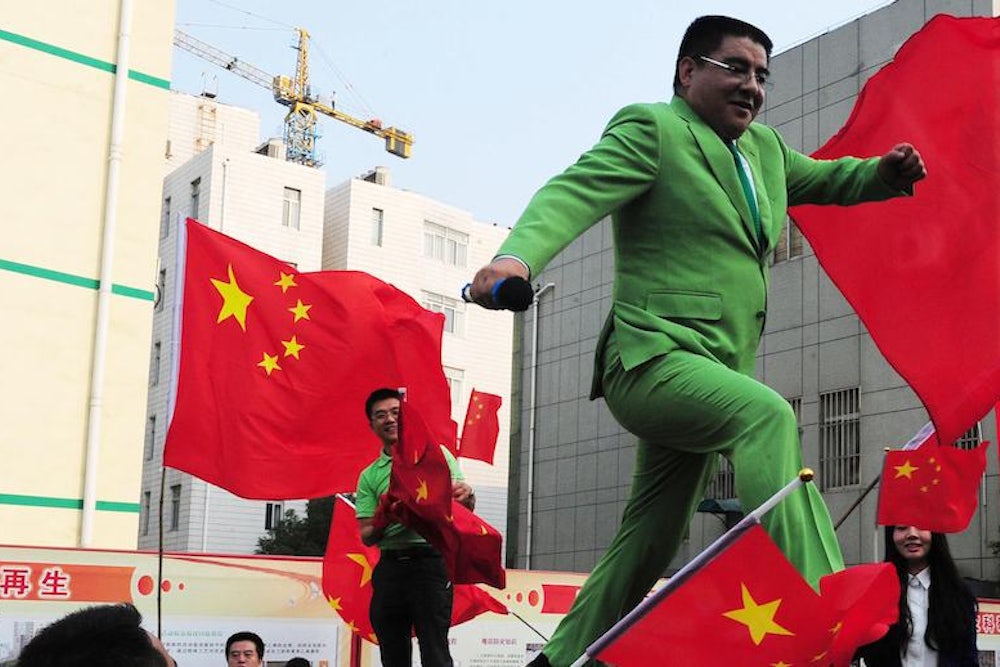Now that Hurricane Chen seems to have passed over New York, it seems worth asking: What was that? The Chinese multimillionaire recycling magnate/philanthropist/self-promoter Chen Guangbiao managed to dominate the western media’s China news vertical for a full week, thanks to a series of hard-to-not-watch moves: an initial statement that he wanted to buy the New York Times (if unsuccessful, he said he’d settle for the Wall Street Journal); a much-hyped trip to the U.S. to get treatment for two burn victims who might be political pawns; a bizarre press conference in which he trotted out the burn victims and sang the original song “My Chinese Dream”; his brag that he’s “good at working with Jews”; a planned bid to demolish the Bay Bridge; and finally the business card to end all business cards. He whiffed, of course—no Times purchase, the California bid unlikely—but the real story was the American media’s reaction to Chen: mockery, fascination, and in no small part, fear. For Cassandras of American decline, the only thing scarier than their future Chinese overlords is evidence that the overlords might turn out to be Eastern versions of Donald Trump, only less respectable.
In China, Chen Guangbiao is old news. For years, he has been turning philanthropy into theater. He first made a splash in 2008, when he mobilized 60 of his demolition machines and 120 workers to help rescue victims of the earthquake in Sichuan Province. (He says he personally carried 200 people to safety.) He later handed out red envelopes of money on the streets of Taiwan and traveled to Japan post-Fukushima to distribute rescue supplies. He has posed for pictures in a room made of money, sold “canned air” in Beijing, smashed a Mercedes-Benz to support low-carbon transportation, promoted “going green” by rocking a lime-colored suit, and taken out a half-page ad in the New York Times claiming the Diaoyu Islands for China. He also promised Bill Gates and Warren Buffett he’d give away all his money when he dies.
He may be a showboat, say his fans, but ultimately he’s a force for good. Philanthropy culture in China is still undeveloped. China has more billionaires than the U.S., but gives away only 4 percent of what Americans donate. Charitable giving actually fell in China between 2010 and 2012. Part of the reason was a series of scandals and pseudo-scandals that led Chinese to look askance at large charities. Nor is there a smooth framework for private giving: According to Caixin, “private donations either first go to the government before being distributed, or are funneled into a handful of government-backed charitable institutions.” Charitable organizations don’t enjoy tax-exempt status and, with no inheritance tax, there’s little structural incentive to give away one’s cash. At least Chen is setting an example, however absurd.
Critics say Chen overstates his own generosity. The New Express (a Guangzhou paper whose own reputation has been called into question) reported in 2011 that Chen’s much-touted donations to Xinjiang Province were overblown roughly fourfold. The $4.3 million “senior living center” he built in his hometown in Jiangsu Province? It turned out the only people living there were Chen’s parents and brother, according to a 2011 investigation by Southern Metropolis Daily, while the farmer’s market he built nearby stands empty. Journalists have also questioned the scale of his contributions after the Sichuan earthquake. Some journalists reportedly received death threats.
Angel or charlatan, Chen’s personality makes him an anomaly among Chinese public figures. Politicians, business leaders, and even singers and actors here have relatively controlled personas. Chinese philanthropists don’t usually flaunt their donations, perhaps out of modesty, perhaps because of the unseemly ways wealth tends to accumulate in China. Chen’s brand of “flashy philanthropy” (his coinage) requires not just generosity, but also a fearlessness about attracting attention and the headaches it can create.
For American audiences, it’s that fearlessness—some would say recklessness—that makes Chen come off as silly, but also a little bit frightening. If this doofus can make hundreds of millions of dollars in China and throw it at American properties, who can’t? Chen is only the most recent Chinese moneybags to eye foreign treasure. Previous perceived threats have included the real-estate magnate who wanted to buy 100 square miles in Iceland to build a golf resort, and a Chinese government-backed bid for the Los Angeles Dodgers. Like those larks, Chen may be just another example of things getting weird during an economic boom. Or not. Times publisher Arthur Sulzberger has explicitly said the paper is not for sale. But who knows whether, when he closes his eyes at night, he’s haunted by an overgrown man-child in a lime-green suit crooning off-tune ballads into a microphone.
Correction: The article originally described Chen as a "billionaire." While he is considered a billionaire in Chinese yuan, he is a multimillionaire in U.S. dollars.
